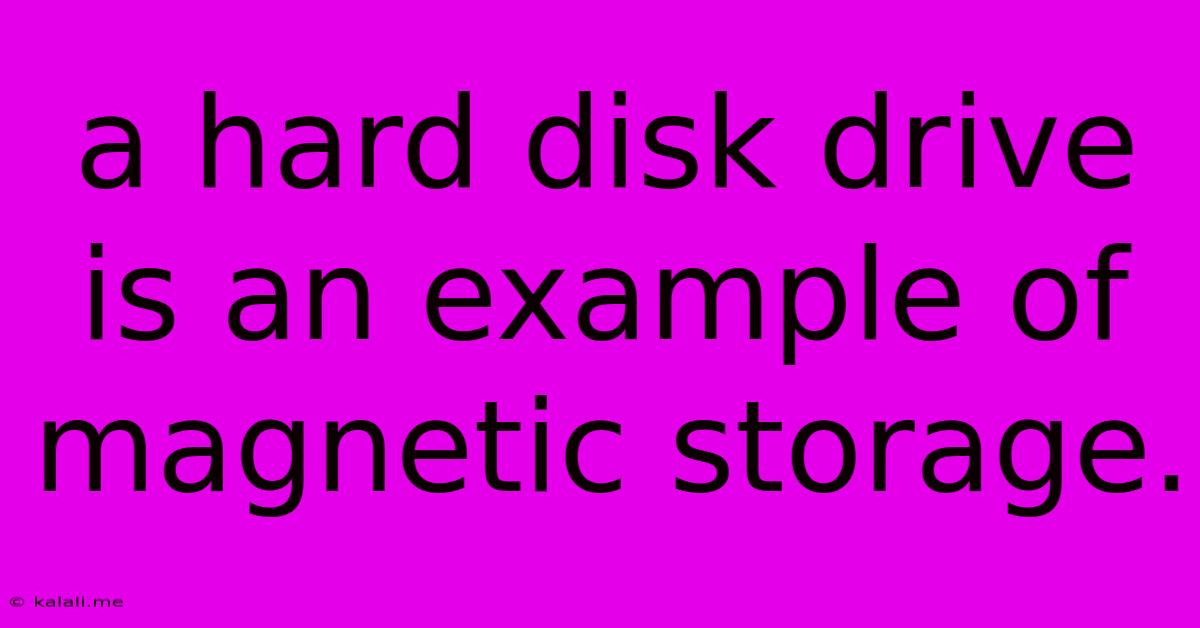A Hard Disk Drive Is An Example Of Magnetic Storage.
Kalali
Jun 14, 2025 · 3 min read

Table of Contents
A Hard Disk Drive: A Prime Example of Magnetic Storage
A hard disk drive (HDD), often simply called a hard drive, is a quintessential example of magnetic storage. This article will delve into the mechanics of how HDDs function, exploring their reliance on magnetic fields to store and retrieve data. We'll also touch upon their history, advantages, and disadvantages compared to other storage technologies. Understanding HDDs provides valuable insight into the broader world of magnetic storage devices.
How HDDs Utilize Magnetism for Data Storage:
At the heart of an HDD lies a series of spinning platters made of a non-magnetic substrate coated with a magnetic material. These platters are incredibly precise, allowing for high data density. Data is stored on these platters using magnetic domains. These domains, microscopic regions on the platter's surface, are magnetized in one of two directions, representing binary digits – 0s and 1s.
The read/write head, a tiny electromagnetic device, hovers incredibly close to the surface of the spinning platters. To write data, the head generates a magnetic field that alters the orientation of the magnetic domains, thus encoding the 0s and 1s. To read data, the head senses the magnetic orientation of the domains and translates these orientations back into data. This process relies on the fundamental principles of electromagnetism, specifically the relationship between electric currents and magnetic fields.
The Evolution of Magnetic Storage and HDDs:
Magnetic storage has a rich history, evolving from early tape-based systems to the sophisticated HDDs we use today. Early HDDs were bulky and had limited storage capacity. However, technological advancements have led to significant improvements in storage density, speed, and reliability. Miniaturization has also played a key role, enabling the creation of smaller and more portable HDDs. This continuous improvement reflects the ongoing innovation in magnetic storage technologies, driven by the ever-increasing demand for data storage solutions.
Advantages and Disadvantages of HDDs:
Compared to other storage technologies like Solid State Drives (SSDs), HDDs offer several advantages:
- Cost-effectiveness: HDDs typically offer a much lower cost per gigabyte than SSDs, making them an economical choice for large-scale storage needs.
- High capacity: HDDs can store significantly more data than SSDs of comparable size, making them ideal for archiving large amounts of information.
- Mature technology: As a well-established technology, HDDs benefit from extensive research and development, resulting in high reliability and well-understood manufacturing processes.
However, HDDs also have some drawbacks:
- Slower speeds: Compared to SSDs, HDDs have significantly slower read and write speeds due to the mechanical nature of their operation (spinning platters and moving read/write heads). This difference is noticeable in applications requiring fast data access, such as operating system loading or running applications.
- Fragility: Being mechanical devices, HDDs are more susceptible to damage from physical shock and vibration compared to solid-state counterparts.
- Moving parts: The presence of moving parts introduces the possibility of mechanical failure over time, contributing to a shorter lifespan compared to SSDs.
HDDs in the Modern Landscape:
Despite the rise of SSDs, HDDs still hold a significant position in the data storage market, especially for applications requiring large storage capacities at a lower cost. They are frequently used in desktop computers, servers, and data centers for mass storage solutions, archival purposes, and backup systems. Understanding the principles of magnetic storage, and the specific workings of HDDs, remains essential in navigating the complexities of modern data management. The continued advancements in magnetic recording technologies promise further enhancements in HDD performance and capacity in the future.
Latest Posts
Latest Posts
-
Difference In Supply And Quantity Supplied
Jun 14, 2025
-
What Should Be Changed To Make The Following
Jun 14, 2025
-
A Is The Smallest Unit Of Language That Conveys
Jun 14, 2025
-
Which Of The Following Is Not A Nutrient
Jun 14, 2025
-
Which Of The Following Series Converge To 2
Jun 14, 2025
Related Post
Thank you for visiting our website which covers about A Hard Disk Drive Is An Example Of Magnetic Storage. . We hope the information provided has been useful to you. Feel free to contact us if you have any questions or need further assistance. See you next time and don't miss to bookmark.